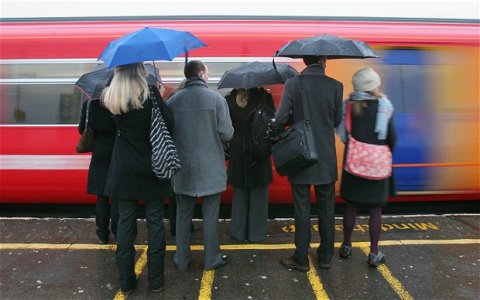
15 January 2019
The government has appointed Keith Williams as the chair of the biggest review of our railways since privatisation began. This is your chance to have your say over the future of our railway.
You haven't been asked your opinion on privatisation since 1994! Here's your chance:
Comment below to sign this letter and tell Keith why you want to see public ownership of the railways.
Dear Keith Williams,
Our railways are clearly not currently fit for purpose.
Train travel has never been so popular. But the service passengers receive is deteriorating. We've seen repeated delays and cancellations across the network. Trains are overcrowded. Rail fares continue to spiral up and up. Train companies have failed to invest in new infrastructure. Our railways are broken.
We believe that public ownership would help solve these problems - so we're really happy to hear that you've promised to keep public ownership on the table in your review.
By taking private companies out of the rail network, we can:
- Remove shareholder profits from the system and reduce costs.
- Use these savings to fund reduced fares, and a rail service run for people, not profit.
By putting the public at the heart of our railways, we can:
- Ensure they get the investment they desperately need.
- Use this investment to improve services, reduce delays, and upgrade the rolling stock.
76% of the public agree, and we want to see our railways in public hands.
Yours,
The public.
Comment below - Why do you want public ownership of your railways?


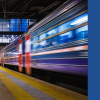
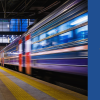
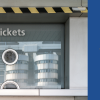
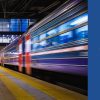
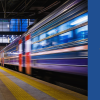
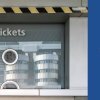
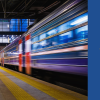

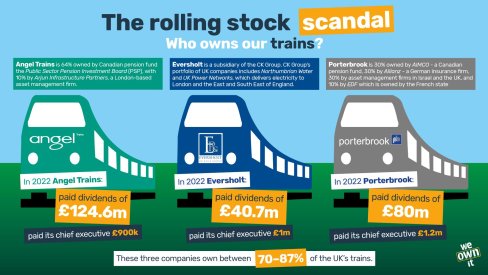
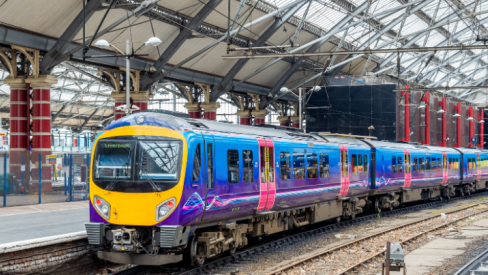
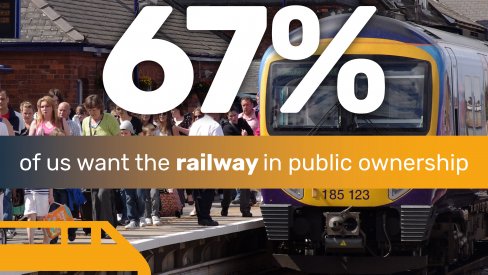

Comments
Peter Whalen replied on Permalink
We need to take back control of our railways and run them as a public service. At the moment people are priced off them which is so wrong. Social ownership is the way forward to a faster, cleaner and greener service.
chris earl replied on Permalink
Private railway companies keep increasing fares, to make a profit for it’s shareholders, with no improvement for their users.
With current concerns about Climate change, how do you persuade people to use public transport over cars when travelling by car is the cheapest option! And often more reliable.
Keep railways in the public domain, services will be better integrated, and any money that is made goes back to the public funds.
Jodie Adamson replied on Permalink
I believe public ownership of the railways is an excellent idea. The east coast line was great when in public oownership and I feel happier paying for a ticket if I know the money will be invested for improving this public amenity rather than for private profit.
Brin Wilson replied on Permalink
I have no choice about my train service provider. There is only one station and one company running trains. It is a monopoly and a license to print money for leeches like Branson and Soutar and for foreign governments. Why is my overpriced ticket being used to subsidise fares in the Netherlands?
John Hinchliffe replied on Permalink
Since the railways were nationalised after World War Two, the Tories, who opposed nationalisation, have pursued policies to undermine that nationalisation. They do not care how the service operates, they simply have a political agenda that opposes nationalised industry and nationalised services despite the reality that privatised industry does not always deliver services efficiently. The NHS would have been totally privatised by the Tories except they know it would be electoral suicide - so they do it in bits and secretly so people do not notice. The Tories decimated the rail service in the 1960s removing less profitable lines (to prepare the network remaining for privatisation?), and Thatcher completed the job! The railways are a service that requires coordination and long term investment and long term commitment from government to maintain and develop the service for the benefit of service users, the economy, and the country. Until Tories question their belief in the ability of the free market to provide public services for the whole country then efficient effective rail services are doomed, as they will continue to undermine anything they consider as a socialist enterprise.
Nick Windsor replied on Permalink
Please, please ask the award winning Economics Professor Marana Mazzucato to be an adviser for this review. She is insightful, intelligent and a world authority on private vs public sector organisations. I understand that the railway operators are subsidised by the Government beyond that of when it was State Owned, this cannot be a morally just way to operate a Nation's infrastructure.
David Walker replied on Permalink
Privatisation merely provides an opportunity for greedy people to enrich themselves at the expense of the public and to the inconvenience of users. It is essential that the notion of public service return to the heart of our society's belief system.
Alan Burnett replied on Permalink
Under the present privatised regime, rail services are frequently cancelled, terminated or started at an interim station, often with seat reservations cancelled.As a result, people are using their cars instead of the train because they need reliability. I randomly check the National Rail app for different stations on the network and I see a railway that fails to deliver every day of the week. Public ownership is the only sensible way forward.
Alan Trangmar replied on Permalink
Every time East Coast Main Line is in publis ownership, it works. Every time it is privatised, it gets problems. Moral: keep in the public sector. (Govia Thameslink is another good example of a private company displaying great incompetence)
Gabby Taylor replied on Permalink
Passengers deserve to know that the rail fares they pay are going to be invested in maintaining and improving the service they rely in stead of being siphoned off to provide dividends to shareholders.
david honeybell replied on Permalink
Public transport should be just that, PUBLIC OWNED. PUBLIC FUNDED. and PUBLIC RUN. Managers should be appointed
who believe in running public transport for the passengers, and not for private profiteers to line their pockets.
And the same principal applies to all public services, ELECTRIC GAS and WATER. All essential services should be
owned by the public. How have we let the situation get as bad as this? Privatisation must be stopped, and reversed.
Gary Joseph Rowlands replied on Permalink
Money cannot be allowed to be taken from the system and into the pockets of shareholders, every penny must be ploughed back in to improve the service, it's got a long way to go before it can be called fit for service.
Katharine Kite replied on Permalink
Private car ownership is the same price now as 20 years ago. Public transport is over 60% more expensive than 20 years ago. We are in a climate and biodiversity meltdown, air pollution is killing us and public money is being squandered on more roads to ease 'congestion'. We have congestion cos of too many private vehicles. More roads means more private vehicles and more congestion. We pay overhikes for public transport to line the pockets of shareholders. This enslavement to ideology is benefitting the richest and disenfranchising the poorest and we wonder why we have a fractured society. Public ownership to enable superior and fairly priced transport is more than just about transport. It's about a far more pleasant environment, less destruction and more opportunities for more people. Please get on with it.
Sam replied on Permalink
Travel by public transport is too expensive, and there has been too,little investment in the last 40 years. Public ownership would mean all profit put back into the services, meaning better and cheaper service. We cannot afford a season ticket, yet have to get to work. The current service is v bad indeed, overcrowded, over-priced, poor standards.
Jeff Moore replied on Permalink
Public ownership is the only way the railways can work, so long as the bean-counters in Whitehall aren't in control, because like most accountants they know the cost of everything, but the value of nothing.
Fiona Hobbs Milne replied on Permalink
The railways are one of our most important and valuable public services, yet passengers are very obviously not a priority at the moment, and the experience of catching a train is far too often a nightmare: expensive, uncomfortable, cramped, delayed, cancelled. Shareholder profits will always come first if the trains are operated by private companies.
Alison replied on Permalink
Publicly owned railways are the way to go. It makes sense to plough profits back into the railways to provide a better service for passengers, by keeping trains updated and repaired, to maintain tracks, and to generally improve on the service delivery and journey times.
Private ownership puts money in the back pockets of shareholders, provides a dissatisfactory service for the many thousands of users when paying commuters have to stand for the entire journey. Not only is this totally unsuitable, it is downright dangerous in the event of an emergency stop/accident
Jane M replied on Permalink
As a former bus conductor and regular user of buses and trains, I really feel passionately about public transport. It is a public service and should be run to benefit the public not make massive profits for private companies and shareholders, nor should it help the pension schemes of other countries. I'm fed up of paying ludicrous amounts to sit on cold platforms and bus stops for buses and trains that either don't arrive or turn up late and already full. The fares are absurdly high. It cannot be right that it is cheaper to fly from Bristol to Glasgow than to go by train. With different companies running different lines nothing is properly co-ordinated. I say re-nationalise them and ringfence ALL the profits to improve the services. Privatisation has been a total shambles and enough is enough.
Stewart Lauder replied on Permalink
The issues with the train operating companies are only part of the overall problem with railways in the UK.
In my opinion, I believe there needs to be sweeping changes throughout the industry as a whole, including senior management within Network Rail and the Civil Service. Public ownership can only be a success with those who want it to be a success and who whole heartedly believe in public services for the benefit of everyone. Malignant management and cultures need to be eradicated and fresh, constructive, forward thinking approaches taken.
K Noble replied on Permalink
Our railways should be an integrated service run for the benefit of the public and not to make profits for shareholders. With efficient public transport the health of both our people and our economy will improve.
Tom Wood replied on Permalink
I want to see the railways in public ownership so they can once again be run as a genuine public service. Whereas freight is important it cannot, except in exceptional circumstances, take equal or priority access over passenger services. There needs to be sufficient excess of staff, vehicles and infrastructure to allow for maximum flexibility where unforeseen incidents occur to allow the travelling public to experience the minimum of disruption by the provision of extra trains / carriages. Management structures need to empower,facilitate and support staff at the coal face to make real time decisions with regard to connection policies etc without fear of discipline because of fines or costs for "Delay Minutes" etc. The current wholesale cancellation of services and inconvenience to those travelling at a particular time just so as to get the timetabled service back with minimum inconvenience to the operators and other "Customers" (freight) is unacceptable.
Mark Taylor replied on Permalink
It's a public service run as part of the transport infrastructure of a first world nation for the benefit of the citizens of our country and visitors to GB. Not for the short term profit of world wide corporate companies and shareholders. Our railways should be the people's railway. Time to give it back to the people of Britain.
David Hall replied on Permalink
The system at present is too fragmented - connections are fequently missed as one company will not hold back a train so it can meet passengers from another company's train. Profit is siphoned off to company heads and shareholders instead of being reinvested. Far too many companies are involved in owning and running trains, and not enough is spent on infrastructure. Too much freight is carried on the roads instead of much more safely on the railways. With a unified network, we could manufacture our own trains again, instead of exporting profits and manufacturing jobs abroad.
Give us back a state-run railway. Incidentally, why is it OK for our trains to be run by state-owned companies, so long as they are not British? German, Dutch, French.....
SM replied on Permalink
As soon as these services were privatised their prime focus was on profit rather than efficiency. Prices have gone up year on year despite falling standards and reliability. It's time for rail to return to public ownership.
Alan Whittaker replied on Permalink
railways are a public service and as such any money generated should be ploughed back in to the system, not taken out as profits or dividends
Anne Fearon replied on Permalink
The East Coast lline seemed to be working well under public ownership, and made a profit for the public purse rather than for shareholders. When it was re-privatised, it failed again. The only sensible policy is to keep the East Coast line in public ownership and to re-nationalise other lines when their franchises run out
Ron Cross replied on Permalink
I used to enjoy leisure railway journeys, but never had much spare time to do it.
Now that I'm retired, I find that I cannot afford the exorbitant fares being asked.
Anonymous replied on Permalink
The network last year was a complete shambles and it's time it was turned over to public ownership to take control. Almost double the price of tickets on certain lines so one company running the railways would put a stop to these extortionate rates and give us a fair system.
Maria Pizzey replied on Permalink
The most economic and beneficial way to provide public services is to remove the need for third party profits. Public transport is an essential element of successful infrastructure and in increasingly crucial to help fight the planet’s greatest threat of climate change. The railways need to be paid for by the many, for the benefit of the many, not the few who own, operate and own shares in it.
Steve Hoyland replied on Permalink
Private ownership of rail franchises has consistently failed the general public. The railways need to be back in public ownership as in much of Europe.
John Yates replied on Permalink
I was a daily rail user from the age of seven,initially travelling daily to school and then to work from age 18.Now at a pensioner of 81, the high cost of rail travel is nigh impossible ;it scares me although I would still like to travel like I used to. Travel broadens your mind and keeps you young . Public ownership and lower costs would make life better and cheaper!
Karolyn Truelove replied on Permalink
We need a rail system run for the benefit of passengers, not shareholders
Stephen Clarke replied on Permalink
The evidence is not there to support the view that privatised railways run as well as they did here under British Rail.
In times of threatened climate change we need every strategy to increase numbers of people and goods taking the train, as opposed to individual cars, and that kind of environmental concern is not something that more than a tiny few private companies have ever shown.
MarkB replied on Permalink
If private ownership is supposed to be so efficient, then why is 3 times more public money being spent on the railways, than when they were publicly owned.
https://fullfact.org/economy/government-funding-rail-industry-bbcqt/
David Robinson replied on Permalink
What we have now, is not fit for purpose, successive governments have dodged the issue in favour of letting private companies make obscene profits, without putting anything back in
Maggie Lewis replied on Permalink
Railway investment beggared by previous conservative government, is beginning to get back on its feet, but a long way to go. Paying shareholders doesn't make sense. Government ownership would need careful scrutiny and sufficient independent caretakers to protect this valuable public service. I do not wear rose tinted glasses but we could at least return to a simpler system of ticketing.
Alyson Fisk replied on Permalink
Railways should be a public service and should not be seen as a private enterprise to be run for the profit of shareholders.
Margaret Adams replied on Permalink
The railways are an essential public service, like so many others including the roads which so far are almost all still public, and should be paid for by general taxation: Rail is much preferable to the crowded, dangerous, polluting roads, for both freight and as a public transport system for everyone if fares were reduced as in the rest of Europe where of course they have state-owned railways. This would enable more travel by those who cannot afford or do not want a car, could reduce car ownership, particularly in urban areas, reduce lorries, and result in much less pollution and fewer adverse climate change effects. I remember the publicly owned British Rail provided a good, integrated service and at much lower cost than the current privatised system which is fragmented not "joined up", in which individual companies are "not responsible" but blame each other for failures, where profits are taken out instead of being reinvested, where the ticketing and pricing are obscure and complicated, and where companies have a win/win, keeping profits but bailed out by the taxpayer, because it is an essential service, when they fail. The public East Coast mainline ran a good service (Iused it) and made good profits which went to the UK Treasury, but failed in private hands not once but twice, was bailed out at our expense twice and then privatised again - this is wanton ideology. As is not allowing public bodies such as the successful East Coast even to bid (public cannot be seen to succeed), but allowing bids from foreign state railways, so the Dutch, German and French states can own our franchises and run our railways but our state cannot. As with our other once public now private services, such as water, electricity (including nuclear now mainly built/run by the French and Chinese!), the NHS,..... this is surely against our strategic national interests, especially when even our European friends will just be competitor countries after Brexit.
Pippa Richardson replied on Permalink
Our railways are too important to the people of Britain to be in the hands of private companies who just want to make profits, and fail to invest in a quality service. In Wales, it is shocking how the recent private franchise holders neglected stations and rolling stock. Elsewhere, passengers are also receiving bad service. I want to see railways in public hands getting the investment they deserve.
Robert Ormerod replied on Permalink
If you have ever travelled on Cross Country trains between the south coast and Manchester you will know how bad the system has become. When I complained to the guard about the overcrowding he blamed the German government.
How have we got into such a ridiculous situation where most of our trains are being run by state backed European companies which are subsidised by the UK government?
Mike Bowden replied on Permalink
Some years ago I looked into finance of the railways. At that time the biggest take was by lawyers. There were multiple contracts between government, the rail companies, between companies and with the rail owners, all regularly renegotiated and renewed. The second biggest spend was on leasing trains, the trains were owned by the banks and leased to the operators. Third biggest take was directors emoluments and dividends. So the whole system is inefficient and less effective than it can and should be. I doubt it has changed much.
This is true of most government privatisations. In the NHS admin costs went from 3% to 15% with the 1980's internal market and are at 20% with the current (unfinished) privatisation. Do we really want to spend one pound in four on clerks pushing paperwork around?
JasonClements replied on Permalink
There are enormous inefficiencies in splitting the rail network into many franchises. If it were brought under one publicly-owned organisation, there would be great savings in tendering for contracts, monitoring performance and shifting costs between the different elements. And of course, the profits currently paid to shareholders could be reinvested in the service.
Andy Hamilton replied on Permalink
As others have pointed out the UK privatised railways provide a poor service. Our railways are expensive and inefficient compared to French and German railways which i frequently use.
alan chapman replied on Permalink
It's been widely reported that 18 out of 25 UK rail franchises are run by foreign state-backed corporations. Foreign states/investors are not doing this for the economic health of the UK; they are doing it because ownership/investment creates substantial financial return for themselves. Separately, evidence both anecdotal and researched (it's all widely available online) generally reflects that UK railways are more expensive, less reliable, less connected/integrated, and much slower (between big cities especially) than the top performing European nations' railway services. So, we have a fragmented inferior railway service compared to the leading 5-7 nations of Europe, and the profits gained from running it are almost all going out of the UK. Decades ago the privatisation ideology/obsession might have made some sense, albeit very tenuously. The world was very different then, and all economic models are of a certain time, and then they become obsolete and counter-productive. In the modern world there is a need to be much more socially responsible. The past 20 years have proven that healthy societies are not about 'wealth creation' and the mythical nonsense of a nation of share-holders of profit-driven plcs. 'Wealth creation' and the free-market economy in truth creates vast wealth for very few people, and of course to the disadvantage of everyone else, notably staff and customers (the people who fund and enable the 'wealth creation'). The modern world, and the increasing pressures on societies, services and economies, mean that we must be now much more ethical, sophisticated and inclusive in how we value and operate our essential services and utilities. Railway services are not like supermarkets, car dealers, or online retailers, for which we have a wide choice. Railways are a monopoly, and also are an absolutely and increasingly crucial part of people's lives, and most certainly, when we consider road traffic congestion and pollution, of the health of people and planet too. Taking the railways back into social/national ownership is not just about quality or reliability or price; it's about the type of country we want for ourselves and our children. Do we want a nation whose vital services are run exclusively and determinedly to extract maximum profit out of our society (typically benefiting a very few faceless already obscenely wealthy people, who naturally put profit first), or do we want a nation whose vital services are run exclusively and determinedly for everyone in our country, where all 'profit' is reinvested for the good of the service, staff and customers, and the development of infrastructure/technology? The situation surely speaks for itself, and the railway companies must be taken back into social/national ownership. The question is then simply doing the maths to compensate the current ownerships, taking very firm account of how little the private sector paid for these assets in the first place, the vast profits that have been extracted, and the serious shortfalls in investment and development that must now be made good.
Jack Nilsen replied on Permalink
Public ownership of rail is essential if we are to see lower fares and better services.
Safir replied on Permalink
It's time for full renationalisation of railways and utilities.
Privatisation means people pay higher charges and higher bills for privatised services then pay more money through tax used for government subsidies to privatised companies and customers pay even more for improvements whilst funding executive salaries, shareholder dividends and private profits.
Even worse some owners of privatised utilities have had billions of pounds of corporate debt loaded on to formerly debt free privatised utilities that results in higher bills for all customers including those on low incomes.
Some privatised companies have even used offshore tax havens.
It's time for public ownership by the people, with the people for the people, it's time for full renationalisation.
Nigel James replied on Permalink
I believe that public transport is best provided 'publicly' not private companies who need to generate profits for shareholders ahead of the public good. I believe too that we would get better value for money.
Graham Marsden replied on Permalink
Why are our "privatised" railways owned in large part by European *State* owned companies? Why are we subsidising their networks?
Money invested in the railways and paid by travellers should generate profits which are returned to finance the network, not put into the pockets of those who do not even ride in the trains.
Privatisation has been a failure, it's time to take back control of them(!)
Ruth Richardson replied on Permalink
Breaking up the railway system was a really stupid idea that hasn't worked. The old way of allowing the funds earned to go back into the kitty, instead of sucking the system dry for shareholders, was a better system, and something the public supported.
What we have is a broken system. Privatisation doesn't work!
The railways should be unified, and under public control, a service to the whole country.
Ian Hopley replied on Permalink
I'm not totally against free market competition, but the minute you need a "regulator", you cease to have a free market. All you have, is a cynical parody of a free market as a means of making money for shareholders. If I want to take the train to london, I can use Virgin or... Virgin.
Helen Austerberry replied on Permalink
Railways are a public service so lets own the service and operate it in the interests of the many. Private providers benefit from creaming off the easy money that monopolies gift them. Under public ownership services can be planned and co-ordinated, and innovative systems of control and management can be initiated involving workers, passengers and local communities. The money that funds the network from passenger and taxes can be used for the public good not wasted on shareholder profits and bloated executive salaries.
C Critchley replied on Permalink
As we move into a fifth the way through the 21st century, the predominance of the digital economy has rendered movement from domicile to place of work, irrelevant. Oh, did I get that wrong? An economy which relies on the transportation of workers from one place to another must provide, without exception, a means so to do. If this is an incorrect observation, simply let these irrelevant 'services' stop, for they are surplus to requirements. No services. No provision. No companies. No profit. No necessity. If you believe our 'commonwealth' deserves minute attention, then you'll be wanting 'route & branch' revolution. #ToriesOut
Brenda Lock replied on Permalink
Privatisation of the railways has been a disaster. Railways should be in public ownership and run for the benefit of the public not for shareholders.
Richard Smart replied on Permalink
The British railway system should always have been in public hands. It is a public service and as such should be run for the benefit of the public, not for private investors and shareholders. Public ownership is the only justifiable way forward.
Isaac R-G replied on Permalink
Public transport should be a public good, with investment guaranteed to help make society more equal by increasing availability of opportunity.
Nick Tidiman replied on Permalink
It is essential that the use of rail grows and grows to reduce the strain on the environment. It is also imperative that the rail network is affordable, integrated and efficient and to do this it must be a public owned service for the good of the public.
Stephen Riggott replied on Permalink
About time we had a say about our Railway System! These "Leeches", that call themselves "franchisees", who've borrowed our once wonderful railway, have sucked out enough dividends and cash to last a lifetime, and then they have the cheek to cry that they can't fulfil their contract, leaving the taxpayer to bail them out!!! I've worked for the railway for many years, both under public ownership, and also during the privatised era, and I can tell you, quite categorically, that 'Nationalised' beats 'Fragmented' any day of the week!! Time and time again it has been shown, that when the Private Companies fail, and the franchise passes back to Government Control, it's been a success story and, miracle upon miracle, it actually becomes a good service again, makes a profit which goes back into the exchequer to invest in the improvement of the railway system! Please Bring Back British Rail and start the transition back to an affordable, sustainable and more efficient system, at last!!!!
Robert Johnson replied on Permalink
Privatised rail services have led to much higher fares and a poorer service. Only a publicly owned railway network can deliver the modern and efficient integrated transport system the UK needs.
Gerald McGowan replied on Permalink
The privatised company that ran GNER could not make a profit and was re-nationalised as the only sane alternative. It, and all the other companies that are complained about, should be re-nationalised and the profits that are paid to their shareholders should be used for the good of all the travelling public.
If we needed another reason then Chris Grayling comes to mind!!
Anonymous replied on Permalink
Private rail companies have made an expensive shambles of our railway system. At a time when public transport is desperately needed, to help save the planet, our railway system is unpredictably over-priced and unreliable.
Simon Smith replied on Permalink
The privatisation of the railways and a deliberate fragmenting of the accountability for their running has been a disaster. Pure ideological ignorance.
Mavis Williams replied on Permalink
Privatisation isn't working for passengers. We need to renationalise our railways.
Jill Spicy replied on Permalink
Abellio Greater Anglia is Dutch/Japanese owned, whose own trains are pristine and cheap to travel on, very unlike the ones in use here.
Dawne Brown replied on Permalink
The railways are a public service we pay for the profits should be used to improve the service, not subsidise private companies or foreign organisations public services. Private companies cannot run the railways efficiently or provide an adequate service they are more interested in profit lines. When the east coast line was taken into public ownership, the service improved.
Trevor silkstone replied on Permalink
Too many other foreign powers are in charge of our transport and Railways, we need to confiscate this power they have, and the money they cream off for selves. Since being in the EU all of our best industry has been sold away to foreign investors who don't give a shit for the British Public. The railways need to be back in public ownership, and the money intended for HS2/3 should be spent on refurbishing some old systems and making the transport system fit for the common man to use on a daily basis.
APRIL BROWN replied on Permalink
its been run badly.It's a public service and should be run for the public service.
Roushan Martens replied on Permalink
Private companies have been a disaster for rail travel, with costs and services becoming increasingly poor for passengers.
Stuart Aken replied on Permalink
Privatisation has proved a disaster. Never has there been so much dissatisfaction with the railways system. Timetables are difficult for passengers to follow, the multiple fare tables make travellin by train a nightmare. We need a centralised, cohesive railway system fit for a future where public transport will be more and more necessary if we're to fulfil our country's carbon reduction promises. The current system, run for profit, is inefficient, fragmented and unfit for purpose. Let's take the railways back into public ownership and make them great again.
Barry Metcalfe replied on Permalink
Private Rail Companies are run for profit, not for the public benefit. I find them to expensive to use. I live 5 minutes walk from a station on the Euston to north west line about 35 miles from London and as a pensioner cannot afford to use it. Unfortunately by bus it is 4 bus rides away and a twenty mile detour, taking several hours to complete, so the train services have a virtual monopoly.
A. M. Reeve replied on Permalink
When East Coast was taken back into public ownership the service was much improved and also the staff were happier.
The privately owned railways are in a bad way, and the need to remove money for shareholders can only make things worse.
Arte replied on Permalink
The claim that privatisation helps businesses be more efficient and better for all is plainly wrong when considering the railways. Why not bring them back under public ownership and try to clean up the mess that it currently is? Having foreign investors making money off of our need to use public transport is a disservice to citizens living here.
Jenny Reid replied on Permalink
Privatisation has been a disaster, allowing the trains and services to deteriorate whilst becoming ever more expensive.
Gail Parker replied on Permalink
At the moment, all the financial risks sit with the public while shareholders reap the benefits. Also, there is too much inconsistency allowed in service provision across the different providers.
Michael Coulson replied on Permalink
We pay more for a badly run service than we would for a good one because companies can pass on the cost of delayed or cancelled trains (replacement bus services or taxis, fines) by increasing fares). We need railways that put people not first!
Jeremy Hall replied on Permalink
My beneficial owners of my railway are the Dutch tax payers. Why can't the British people be the beneficial owners.
melvyn dalley replied on Permalink
Public services are vital ,not making profit for share holders , any money made should be put back into the service.Let it be run fairly and in full public ownership
julia blake replied on Permalink
Reinvest in public services and stop public money being sifted out via private enterprise. Privatization is a failure, only profiting shareholders whilst the public is paying twice for that privilege, first by way of subsidies and then being grossly overcharged for the service. Other European countries run fantastic public services and customers pay a fraction of the price we in the UK do, we could learn a lot and enable greater equality and a country that actually works for the many, not the few but instead, the UK government chooses to uphold an outdated and corrupt elitist establishment that wishes to create slaves to the economy for the people whilst the fat cats sit back and reap the rewards. ENOUGH IS ENOUGH..let's really take back this country for the people, for the many, not the few.
Jane C W replied on Permalink
The railways were nationalised after the War to serve the nation, until in recent years they were sold off to make a profit for a few people at the expense of passengers and where services have become increasingly shambolic. The railways and other transport systems must come back under public ownership to be run efficiently and affordably for the people, as they are in other parts of Europe today.
Roy Koerner replied on Permalink
Privatisation has meant that the railways are run for short term profit. This means cutting costs to the minimum and not building in enough space capacity to cater for excess demand.
There is also no incentive to coordinate timetables between rail companies and local bus operators.
Caroline Snow replied on Permalink
Our public infrastructure should be owned by the public for the benefit of the public.
Sue Tame replied on Permalink
We need a subsidised, integrated public transport system.
John stewart replied on Permalink
A privatised rail system has failed massively particularly in rural areas where train services are almost non existent, it is time to bring all rail ack into public hands and run it as a public service for everyone, not just a money tree for th shareholders of private companies or worse overseas countries benefiting from the profits made to improve there systems, invest any profit back into the system here and build a system that works and is accessible for everyone.
Helen Pearson replied on Permalink
To run public services for private profit is an oxymoron. It must infuriate rail users that a small number of individuals are receiving huge bonuses instead of that money being used to improve services and keep fares reasonable. In its five years as East Coast, the state-run firm returned a little more than £1bn in premiums, as well as several million in profits, to the Treasury. Detailed financial analysis from the Office of Rail Regulation shows it was one of two firms to make a net contribution to government coffers; it also received overwhelmingly positive passenger feedback. After it was last privatised, it only ran under Stagecoach/Virgin for three years before being put back in public hands after record losses. Running public services for private profit only works for the shareholders; everyone else, including taxpayers who bail out loss-making companies, is impoverished.
Angela replied on Permalink
The evidence shows that since privatisation the railways have performed appallingly. We need an efficient service that works for everyone. This will encourage more people to use it thus reducing congestion on our roads. There are so many positives to putting the railways back into public ownership.
Mark Allen replied on Permalink
East Coast Mainline and Northern Ireland Railways have both show how much better a railway service can be in public ownership.
Penny replied on Permalink
I am a frequent train traveller, nowadays mostly for leisure and longer distance. I believe the ridiculous franchising system results in inefficiency, lack of co-ordination and a huge waste of public money. There is enormous cost involved in tendering and managing (badly) the contracts. Any change results in expensive branding changes and an outrageously complex ticketing system. A ticket I purchased recently I managed to reduce from £93-30 to £24-60 by ticket splitting. I resent the fact that I have to waste time like this but most of all I'm concerned for people who can't do this for some reason
Public ownership doesn't have to be a monolith. Private investment is ok (cf Deutsche Bahn) but control should be with a single public body fully accountable to us, the public.
Penny replied on Permalink
I am a frequent train traveller, nowadays mostly for leisure and longer distance. I believe the ridiculous franchising system results in inefficiency, lack of co-ordination and a huge waste of public money. There is enormous cost involved in tendering and managing (badly) the contracts. Any change results in expensive branding changes and an outrageously complex ticketing system. A ticket I purchased recently I managed to reduce from £93-30 to £24-60 by ticket splitting. I resent the fact that I have to waste time like this but most of all I'm concerned for people who can't do this for some reason
Public ownership doesn't have to be a monolith. Private investment is ok (cf Deutsche Bahn) but control should be with a single public body fully accountable to us, the public.
Michael Fields replied on Permalink
Why should we continue to let (mostly) foreign companies make profits from our railways while they provide diminishing standards of safety and efficiency in return? The government is deliberately running down all public services in order to sell them off, which is not in the interest of the ordinary people of this country. It can be done better for us!
Rob Dixon replied on Permalink
Privatisation is not and should not be the only option for running the railway... especially when the franchises are largely run by other countries' state railways!
David Farrelly replied on Permalink
The UK railways were privatised in 1993/4. It was stated and clearly envisaged that two things would happen. Firstly, that the discipline and efficiency of the private sector would improve rail services and service delivery. Secondly, that rail subsidies from the tax payer would be tapered down due to the effectiveness of new business centred leadership of our railways.
The reality has been that costs, subsidies and fares have risen exponentially. Performance has never exceeded the 1994 levels achieved by British Railways. Furthermore deterioration in services, costs and efficiency have also been self evident. Control, leadership and oversight are and have been weak from the DfT, Network Rail and private enterprises. The franchise system has failed despite several reviews and direct interments from the government.
Renationalisation is popular with taxpayers, rail users, unions and the general public. We have had enough of inept leadership and empty promises of new investments that will at some uncertain point in the future promises us a decent and fit for purpose 21st century railway network.
William Hawkins replied on Permalink
Public transport should be for the benefit of the public (it's even in the name!) and not for the benefit of private, greedy companies or shareholders.
S K SMITH replied on Permalink
The railways work for the good and benefit of all best as a public service and it makes no sense at all to have private companies competing for profit. No only does it make no sense but there is also the non-market place question of the tax-payer being used as a handy insurance policy by the government when companies fail. Further, the split up system is ridiculous and inefficient. It is a night mare to book journeys and there is no truly accountable customer service. Privatisation of the railways is a broken system that should never have happened in the first place.
Sam Monk replied on Permalink
I strongly support renationalising the railways. Re-nationalisation will enable profits to be invested back into improving the service, including the electrification of the north, rather than going into the pockets of shareholders. As the need to confront climate change becomes more pressing we need a viable, efficient and functioning railway that is affordable for all. Re-nationalisation will help to achieve this.
Anthony Conway replied on Permalink
Fragmentation of the railways has worsened services for all. Services are nolonger run when people wish to use them outside of commuter services. These services are used as cash cows for share holders. There aren't enough staff and lack of joined up services mean that employees of different companies cannot assist. Ticket prices don't make sense with costs per mile being exorbitant in many cases. There is no accountability for the service. Bring back into public service.
Sonali Bhattacharyya replied on Permalink
We are reaching crisis point with the climate, but instead of investing in an efficient, reliable and affordable rail service - the only way to reduce people's reliance on cars in the UK - the government have allowed private companies to run the railways into the ground, with overcrowded trains, fares so high they're unaffordable to many, and an extremely unreliable service. Railways need to urgently be returned to public ownership.
Geoff Weaver replied on Permalink
The success of the East Coast line under public ownership has set a precedent.Grayling must follow the logic and return the railways to public ownership.
Alastair Young replied on Permalink
Functioning efficient transport please. The privatisation shambles doesn't offer choice or service for the public. No arrangement on a "for profit" basis can work.
Bring it back.
Gary Clarke replied on Permalink
The privatisation of the UK's railways has clearly been a failure. It has led to a fragmented system with poor service and extortionately high fares. The rail companies are putting shareholders before passengers. I am a regular user of trains as I do not drive and the fares are way too high. On longer journeys it is prohibitively expensive if I do not book in advance.
I would very much like to see the railways in the UK brought back into public ownership and I believe opinion polls show the public support this by about 58-60%. Therefore, there is a clear majority for brining the railways back into public ownership and this is the logical thing to do.
R D Dalgleish replied on Permalink
British Rail Intercity 125s built last century are still in regular main line use to deliver profits to people who choose not to invest in designing better trains. How long can this exploitation continue? There is only one rail system. It is a natural monopoly best suited to single ownership. Who should the single owner be? The passengers who use the system.
Nick Avins replied on Permalink
We need to stop the gravy train of European state companies running our trains and go back to a public railway. BR built the finest trains such as the Mark 3 and 4 which were comfertable and had seats that lined up with the windows! BR suffered from lack of investment by the Tory goverment so I do think it is unfair to say public owned rail was a bad thing. Despite all this, Intercity and Network Southeast operated with no subsidys, something the alleged wonderful private operators seem unable to do.
Pages
Add new comment